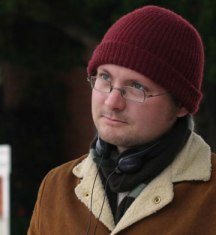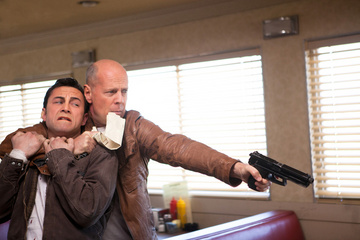What started out as a three-page script almost a decade ago has turned out to be writer-director Rian Johnson’s most successful film to date, Looper. The time-travel tale stars frequent Johnson collaborator Joseph Gordon-Levitt and Bruce Willis, both playing the same character from different points in their lives. “It was less (about) taking 10 years to get it done and more kind of writing it and thinking it up eight years later,“ he explains. Johnson recently spoke with AwardsLine about why it’s fun to work with friends and how he’s learned that directing is more about listening than anything else.
 AWARDSLINE: When you expanded your initial three-page script into a feature, you wrote with Joseph Gordon-Levitt in mind for the main character. What makes collaborating with a lot of the same people on your films work well for you?
AWARDSLINE: When you expanded your initial three-page script into a feature, you wrote with Joseph Gordon-Levitt in mind for the main character. What makes collaborating with a lot of the same people on your films work well for you?
RIAN JOHNSON: The main benefit of it is just that level of trust that’s automatically baked into working with someone who’s a friend of yours. What I hope that leads to is giving you the comfort level to take some risks or try some things you may be otherwise afraid to. Because you have leapfrogged putting a lot of energy into forming a new relationship, you can redirect that into just making the movie better. But our sets don’t feel like cocktail parties; our sets tend to be really focused places.
AWARDSLINE: When did Bruce Willis get involved in the film?
JOHNSON: I’d thought of the part for Joe, but when we started casting, Bruce was the first person we went after. I really didn’t think we would get him, just because some of the darker elements in the script. I mean, in the movie, he does some very un-Bruce Willis-like things. (But) he responded almost immediately to it and then set up a lunch. I was terrified and shaking like a leaf, but I went to lunch with him, totally expecting him to say, “Well, I’m interested, but we’re going to have to change this and this”—and there was absolutely none of that. He was just really into it and ready to get to work. It was kind of disconcerting, actually.
AWARDSLINE: There’s actually a scene in Looper when Willis’ character is shooting up an office that made me think, “This is the Die Hard scene they just worked in. This is what everyone wants to see.”
JOHNSON: (Laughs). It’s funny, that scene was there before we even knew who we were casting, but Bruce coming into that role adds an extra dimension to it where it feels like it was written for him. Besides the fact that Bruce is just a great actor, I thought it would be very interesting—particularly with this part and with this script—how his action-movie persona and how audiences’ expectations of that would interact with his character’s arc.
AWARDSLINE: As a writer and director, do you generally go into production with a locked script? Or are you fine-tuning while you’re shooting?
JOHNSON: With something like this, there’s not a ton of improvising that you can do, just because it’s an interlocked puzzle to some extent. But at the same time, by the time I get on set, I feel like I’ve had a version of the movie in my head for a couple of years, and it’s not that interesting for me, so I’m looking to find people who are going to surprise me. I’ve come from the mode of storyboarding everything out, having everything very planned, that low-budget kind of filmmaking. But one of the things I’m trying to do to grow as a filmmaker (is) get better at being open to the moment on set. So there were a lot of scenes in Looper where if a moment didn’t feel quite right, we would be sending the crew away and taking half an hour to talk it through with the actors. So much of directing is not directing but just listening and being present in the moment and just keeping your eyes open.
AWARDSLINE: Did you consciously decide not to get too caught up in the details of time travel when you were writing?
JOHNSON: Time travel from a writing perspective is such a beast, and I knew that. Even if you take the approach that we took with Looper, and you don’t have a “chalkboard” scene—you don’t have a scene where they explain it all out—that doesn’t mean that you can’t have your system for how all this works. I did spend nearly a year working out my set of rules. Then that just serves as an invisible foundation. The tricky thing is once you spend all that time creating all those rules, the temptation is to explain them. The temptation is to lay it out and show the audience how clever you’ve been. There may be a segment of the audience that may miss it not being there, but at the end of the day, it’s not what the story’s about.
AWARDSLINE: Were there any scenes during production that were particularly difficult to shoot?
JOHNSON: The scene that surprised me in terms of its difficulty, or just how intensive it was, was the diner scene. We had two days to shoot the conversation between (Willis and Gordon-Levitt’s characters). Just a couple of cameras, and two guys sitting in a booth talking. But in its own way, (it was) a lot more intense than any of the action stuff. It was of surprising to me that that was the scene that was the most draining to shoot—and the most exhilarating. Seeing those two actors play off of each other for two days was fun. We actually, in those two days, burned more film than we did for the entirety of Brick.
AWARDSLINE: What’s changed for you since Looper’s release? Are you getting more or better offers to direct and write?
JOHNSON: It’s really cool to be having conversations with people at studios, but for me not a lot has changed—I’m doing the same thing I was doing after the last movie. I’m sitting down to write the next one. Not that there’s not great material out there, but, for me, I’m really just focused on telling my own stories right now, figuring out how to do that. So, yeah, it’s the same thing. I’ve got my head down again in notebooks, hanging around the house and trying to figure it out.
AWARDSLINE: (Laughs). Procrastinating…
JOHNSON: Procrastinating the hell out of it. And I’ll panic in a few months. My house is never cleaner than when I’m writing.

